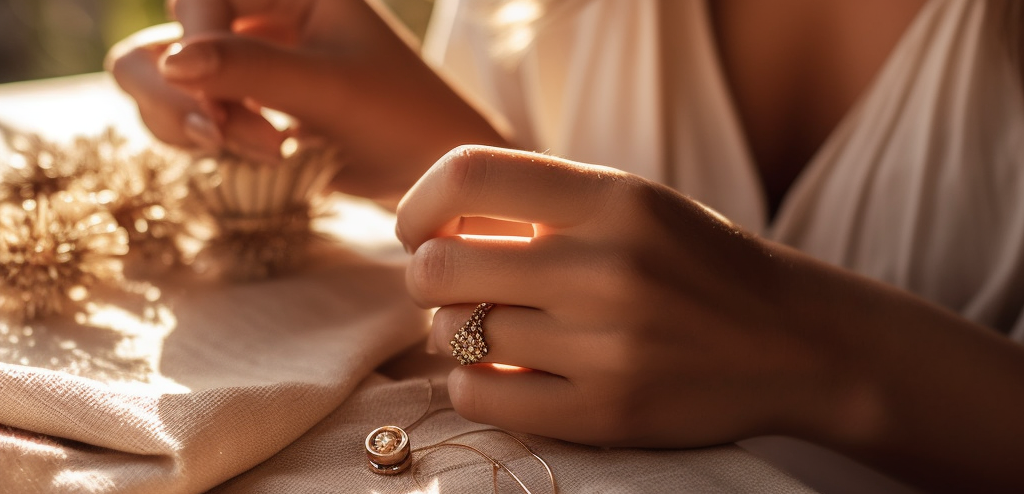So, you've taken the plunge and gotten your ears pierced. Bravo! Now, the real challenge begins: keeping those shiny new holes spick and span. Worry not, dear reader! We've got you covered with our step-by-step guide on how to clean ear piercings. With our help, you'll be a master of ear hygiene in no time.
The Basics: Cleaning Ear Piercings 101
To ensure your ear piercings remain healthy and infection-free, follow these simple steps:
- Wash your hands: Before touching your ears or any cleaning tools, be sure to wash your hands thoroughly with soap and water.
- Prepare your cleaning solution: Use a saline solution or a specialised ear cleaning solution, which can be found at most drugstores.
- Soak a cotton ball or swab: Dip a clean cotton ball or swab into the solution, making sure it's thoroughly soaked.
- Gently clean the area: Use the soaked cotton ball or swab to gently clean both the front and back of your piercing. Be careful not to tug on the earring or irritate the skin.
- Pat dry: After cleaning, gently pat the area dry with a clean, soft cloth or tissue.
- Rotate the earring: Give your earring a gentle twist to ensure it doesn't stick to the healing skin.
When to Clean: Timing Is Everything
- New piercings: For the first few weeks after getting pierced, clean your ear piercings twice daily to prevent infection.
- Healed piercings: Once your piercings have healed, you can reduce cleaning to once a week or as needed.
What to Avoid: Don'ts for Ear Piercing Care
Steer clear of these common mistakes when cleaning your ear piercings:
- Don't use alcohol, hydrogen peroxide, or harsh chemicals, as they can be too drying and irritating for the skin.
- Avoid touching your piercings with dirty hands, as this can introduce bacteria and cause infection.
- Don't remove your earrings during the healing process, as this can cause the hole to close up or become irritated.
Helpful Tips: Expert Advice for Ear Piercing Maintenance
Want to keep your ear piercings in tip-top shape? Follow these handy tips:
- Use hypoallergenic earrings made from materials like titanium, surgical steel, or gold to reduce the risk of irritation and infection.
- If you notice any signs of infection, such as redness, swelling, or discharge, consult a healthcare professional immediately.
- Give your ears a break by removing your earrings every now and then, especially during activities that may cause irritation, such as swimming or exercise.
Time now to start showing off your new ear piercing, you can check out our best selling earring collection like the amazing Emily Heart and Star Hook Earrings In Silver, Zaha Abstract Mixed Metal Lever Earrings in Gold, Aqua Blue Crystal Drop Earrings and Keira Gold Mixed Star Duo Earrings
,
FAQs: Your Burning Questions Answered
Q: How long does it take for ear piercings to heal?
A: Healing time varies depending on the individual and the type of piercing. Generally, lobe piercings take about 6-8 weeks to heal, while cartilage piercings may take anywhere from 3-6 months.
Q: Can I change my earrings during the healing process?
A: It's best to wait until your piercings have fully healed before changing your earrings, as removing them prematurely can lead to complications.
Q: Is it normal for my piercings to itch or feel slightly sore?
A: Mild itching and soreness can be normal during the healing process, as long as there are no signs of infection. If you're concerned or notice any redness, swelling, or discharge, it's best to consult a healthcare professional.
Q: How do I know if my ear piercing is infected?
A: Signs of infection may include redness, swelling, pain, discharge (pus), and warmth around the piercing. If you suspect an infection, contact a healthcare professional for guidance.
Q: Can I swim with a new ear piercing?
A: It's best to avoid swimming pools, hot tubs, and other bodies of water until your ear piercings have fully healed, as they can introduce bacteria and increase the risk of infection. If you must swim, consider using waterproof bandages or a specialised ear cover to protect your piercings.
Conclusion: Keep Your Ears Happy and Healthy
By following our comprehensive guide on how to clean ear piercings, you'll be well-equipped to keep your shiny new holes clean, healthy, and infection-free. Remember, consistency is key when it comes to ear piercing care, so be sure to clean your piercings regularly and follow our expert tips for a smooth healing process. Happy cleaning!

